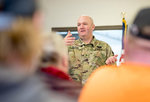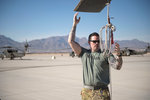Cloudy, 26° F
The way we fight wars is changing; National Guard units are increasingly being called up to deploy to danger zones around the globe.
Units in Wyoming are no different. There are about 1,500 …
This item is available in full to subscribers.
The Powell Tribune has expanded its online content. To continue reading, you will need to either log in to your subscriber account, or purchase a subscription.
If you are a current print subscriber, you can set up a free web account by clicking here.
If you already have a web account, but need to reset it, you can do so by clicking here.
If you would like to purchase a subscription click here.
Please log in to continue |
|



The way we fight wars is changing; National Guard units are increasingly being called up to deploy to danger zones around the globe.
Units in Wyoming are no different. There are about 1,500 National Guard troops across the state of Wyoming; 350 of them are set to be deployed to the Middle East in May — including six guard members from Powell and other parts of the Big Horn Basin. More are involved in Air Guard deployments.
Their roles have changed since the turn of the century, said Brig. Gen. Brian Nesvik, commander of the Wyoming National Guard.
“When the global War on Terror kicked off in the early 2000s, it had a big impact on communities around our country and our state. We saw large deployments of soldiers that in the guard we hadn’t seen before,” Nesvik said. “The bottom line is, right now the Army is asking more of their service members than they ever have — particularly of citizen soldiers.”
The trend isn’t likely to reverse, Nesvik said. Reserve soldiers are now asked to carry on as a citizen, transition into being a warrior while training, be deployed (typically for a minimum of 12 months) and then return to being a productive member of civilian society. Fortunately for all involved, timing has improved.
“We’re better at predicting deployments now,” Nesvik said.
Instead of being called to active duty with a month’s notice, Guard units are receiving up to a year of advance notice. It makes it easier for families to plan for the long separation. It also helps the employers of citizen soldiers.
Along with increased roles and higher standards, more training is required to prepare troops. Troops used to drill about two days a month, with an additional two weeks of concentrated training each year. Now, extra training required to meet high standards means more time away from the job than guard troops are accustomed.
Nesvik and an Army guard team flew to Worland on Friday to hold a Big Horn Basin community meeting to discuss the upcoming deployments and programs in place to assist guard members, their families and civilian employers.
The Uniformed Services Employment and Reemployment Rights Act (USERRA) is supposed to guarantee reserve units can be called up and then seamlessly return to their jobs. But it doesn’t always happen that way. Troops have on occasion returned to find themselves unemployed, Nesvik said.
“You look at a little mom and pop organization and we tell them, ‘we’re going to take your employee for a year,’ it’s a big deal for them,” he said.
Michael and Andrea Laird have been on both sides of the issue. Michael Laird is the Command Sergeant Major of 115th Field Artillery Brigade and has been in the guard for 35 years. After one of his deployments, Laird came home to find his job no longer existed.
“The company was downsizing and they did away with my position,” he said. “They found a loophole.”
It was a stressful time for the Laird family, but it turned out to be a blessing in disguise. He and his wife took the opportunity to start Laird Sanitation 12 years ago, which operates in Greybull and Worland. They have two full-time employees. Now, one of Laird’s employees is being deployed.
“I have to fill his shoes with someone that could potentially turn into a full-time employee, but if I don’t have room for three when my employee comes back, I have to let someone go,” Laird said.
Laird understands better than most how the system is supposed to work, but he also has to run a business. The Laird family will do what’s right, but the sacrifice isn’t easy on either end of the issue.
Kathy Wright is a former soldier and now works with a special support group called the Employer Support of the Guard and Reserve (ESGR).
Established in 1972, the ESGR was initiated to promote cooperation and understanding between reserve service members and their civilian employers. Volunteer ombudsmen step up, in a neutral role, when needed to assist in resolution of conflicts arising from an employee’s military commitment. Both service members and employers have rights, Wright said.
“Employers have the right to know when their employees will be performing military duties,” she said. “Service members have the right to time off for training and deployments.”
There’s not always an easy solution, especially as training requirements are growing and deployments are more often and longer in duration. Both employee and employer have crucial roles in protecting the nation. But Wright feels the moral obligation of employers is more crucial than the legal aspect.
“[The soldier’s] family needs to know that if they need something, [employers] are there and can help them,” she said.
Nesvik — who has a leadership position at the Wyoming Game and Fish Department as chief of game wardens and supervisor of the Wildlife Division — has deployed twice. He fully understands the difficulties associated with citizen soldiers.
“It takes a team to make the defense of our country work,” Nesvik said. “When soldiers are able to do their job effectively, doing what our nation has asked them to do overseas, it’s because the whole team is functioning well and they have good support at home, their family is taken care of and they know their boss is behind them.”